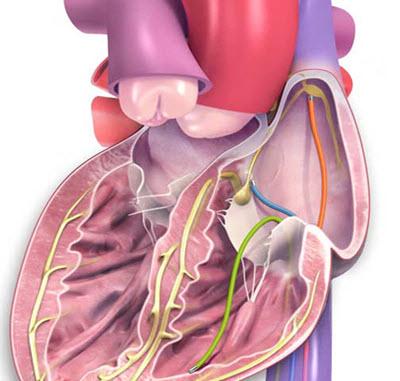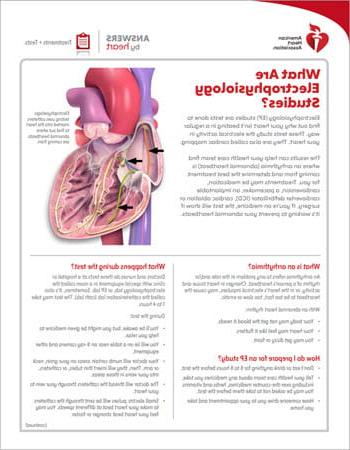电生理学研究
Electrophysiology studies (EP studies) are tests that help doctors understand the cause of abnormal heart rhythms (心律失常).

Electrophysiologic testing uses catheters inserted into the heart to find out where abnormal heartbeats are coming from.
在EP研究中, a thin tube called a catheter is inserted into a blood vessel that leads to your heart. Then specialized electrodes are placed in the heart to send electrical signals and measure electrical activity in your heart.
EP研究可以看到:
- 心律失常从何而来.
- 有多确定 药物 努力治疗心律失常.
- Whether to treat a problem by destroying the place inside your heart that is causing the abnormal electrical signal. 这个过程叫做 导管消融.
- 如果一个 起搏器 or 植入式心律转复除颤器(ICD) 可能对你有帮助.
- 如果你有心脏病的风险,比如 晕倒 或者心源性猝死 心脏骤停.
EP研究的风险是什么?
在大多数情况下,这个过程是非常安全的. 与你的医疗保健专业人员讨论这个问题. 一些可能的风险包括:
- 心律失常. During EP study, you may have abnormal heart rhythms that make you dizzy. If this happens, your doctor may give your heart an electric shock to bring back a regular heartbeat.
- 心脏病 (心肌梗塞)和 中风
- 心脏瓣膜损伤
- Blood clots sometimes can form at the tip of the catheter, break off and block a blood vessel. Your doctor may give you medicine to prevent blood clots.
- Infection, bleeding and bruising at the site where the catheter went in (groin, arm or neck). Your doctor or nurse will help you avoid these problems.
我该如何准备考试?
- Don’t eat or drink anything for 6 to 8 hours before the test.
- 告诉你的医生你服用的任何药物, 包括非处方药, 草药和维生素. 他或她可能会要求你在考试前不要参加考试. Don’t stop taking your medicine until your doctor tells you to.
- Have someone drive you to your appointment and take you home.
- If you usually wear a hearing aid, wear it during your procedure. 如果你戴眼镜,那就带着眼镜去看医生.
在EP研究中会发生什么?
在医院或诊所, doctors and nurses do an EP study in a room that has special equipment for the tests. You may hear this room called the electrophysiology laboratory, or EP lab. 有人称之为导尿实验室(cath lab). 测试过程中:
- 护士会在你的手臂上静脉注射. You’ll get medicine (a sedative) that will help you relax. But you’ll be awake and able to follow instructions during the test.
- Your nurse will clean and shave the part of your body where the doctor will be working. This is usually in the groin but may be the arm or neck.
- You’ll be given a shot – a local anesthetic – to make the area numb. Your doctor will make a needle puncture through your skin and into your blood vessel. A small straw-sized tube called a sheath will be inserted into your artery or vein. The doctor will gently guide several specialized EP catheters into your blood vessel through the sheath and advance them to your heart. A video screen will show the position of the catheters. You may feel some pressure in the area where the sheath was inserted, 但是你不应该感到任何疼痛.
- Your doctor will send small electric pulses through the catheters to make your heart beat at different speeds. 你可能会感到你的心跳更强或更快.
- Electrical signals produced by your heart will be picked up by the special catheters and recorded. This is called cardiac mapping and allows the doctor to locate where 心律失常 are coming from.
- 你的医生会拔掉导管和静脉管. Your nurse will put pressure on the puncture site to stop any bleeding.
- 测试通常持续1到4个小时.
If the type and location of the arrhythmia is identified and an appropriate therapy decided, cardiac ablation or insertion of a 起搏器 or ICD may be performed during or immediately after the EP study.
考试后会发生什么?
你会被转移到恢复室一到三个小时. 在此期间:
- 护士让你呆多久就呆多久. Be sure to keep the arm or leg used for the test straight.
- Your nurse will check for bleeding or swelling at the puncture site.
- 在你离开之前,你会被告知在家里该做什么.
我回家后会发生什么?
按照护士或医生给你的指示去做, including taking any new 药物 that were prescribed. Most people can start eating food and taking their 药物 within 4 to 6 hours after the test. Most can do their usual daily activities the day after the test. 至少24小时内不要开车.
穿刺处可能会痛几天. 穿刺处有小擦伤是正常的. If the site starts to bleed, lie flat and press firmly on top of it. 叫人打电话给医生或心电实验室.
我应该注意什么?
请拨打911,如果你发现:
- Any symptoms of pain or tightness in the chest or signs of 中风 (face drooping, 手臂的弱点, 语音的困难).
- A sudden increase in swelling around the puncture site.
- Bleeding that doesn’t slow down when you press hard on the site.
如果你发现:
- Your arm or leg that was used for the catheter feeling numb or tingling.
- Your affected hand or foot feeling very cold or changing color.
- 穿刺处看起来越来越淤青.
- The puncture site beginning to swell or fluids coming from it.
- 发热
- 呼吸急促(气促)
我什么时候能知道我的EP研究结果?
大多数时候, your health care professionals will ask you to make an appointment to discuss the results of your test. You’ll discuss your treatment options at that appointment.
下载可列印的表格: 什么是电生理学研究? (PDF)






